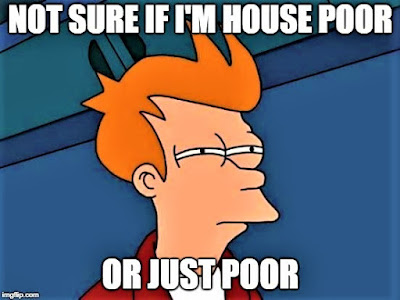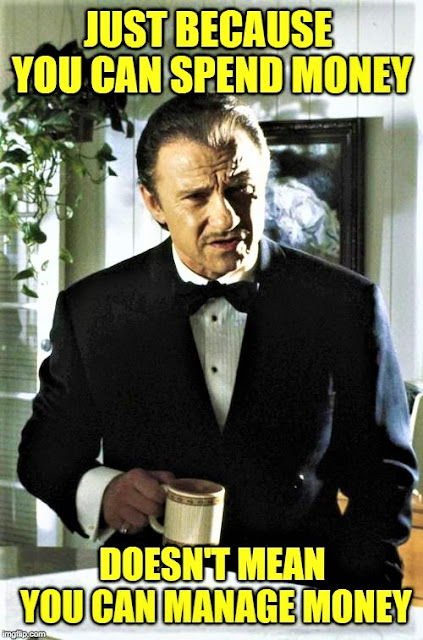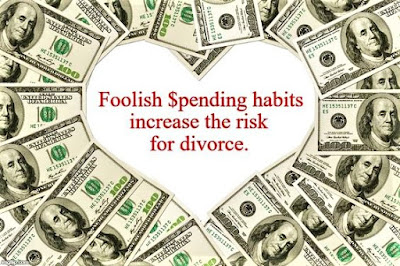 Q: What’s more important than making a lot of money?
Q: What’s more important than making a lot of money?A: Keeping track of the money you make and not spending more than you make -- especially if you don’t make a lot!
Granted, ‘a lot’ is a relative term when it comes to money and income. For instance, people who make over $100k in a year may think that making $60k/year is not a lot, whereas people who make $15k in a year may think that making $30k/year is a lot; therefore, ‘a lot’ is relative based on what a person’s got.
Fortunately, the U.S. Department of Health & Human Services sets yearly guidelines on poverty levels so there isn’t a need for anyone to guess at what ‘a lot’ is or isn’t in the eyes of the federal government; ‘poverty’ is still a fairly relative term though based on where a person lives due to the varying costs of living in different geographical areas of America.
Relative terms aside, for the year 2019, the HHS poverty guidelines for income in a household of two in the 48 contiguous states and the District of Columbia was $16,910; Hawaii and Alaska’s poverty guidelines are adjusted higher due to the higher cost of living in those states; and no matter which state a person lives in, the poverty levels go up based on the number of people in a household.
According to the HHS website, the reason for the poverty guidelines is administrative purposes and to help determine ‘financial eligibility for certain federal programs.’ Since I’m in a household of two I used that number in this blog post, but all the numbers can be found here on the HHS website.
So, what does any of this bureaucratic bosh have to do with keeping track of money? Simple: If you don’t keep track of the money you make, you may find yourself living at poverty levels without even knowing it -- especially lower-earning blue collar workers! -- and I write from experience.
IT ALL STARTS WITH TRACKING THE MONEY (i.e. BOOKKEEPING):
 In the spring of 2017 I finally began to keep track of what my husband and I were spending, and how much money was coming in, but it wasn’t until 2019 when I had almost two full years of bookkeeping spreadsheets that I realized we were prime candidates for food stamps; it goes without saying that that was not a happy moment in my life, but I’ll say it anyway just so there’s no confusion.
In the spring of 2017 I finally began to keep track of what my husband and I were spending, and how much money was coming in, but it wasn’t until 2019 when I had almost two full years of bookkeeping spreadsheets that I realized we were prime candidates for food stamps; it goes without saying that that was not a happy moment in my life, but I’ll say it anyway just so there’s no confusion.Call me a conceited snob all you want, but I invite anyone reading this to leave a comment explaining their life-long dream of qualifying for food stamps, because I’ve never had that dream whatsoever; and if not wanting to receive food stamps makes me a snob, I’d rather be that than on government assistance!
Now, I’m not writing this to put down people who depend on food stamps. I’m writing this to share the slap-in-the-face, kick-in-the-butt, knot-in-the-gut reality check I experienced for myself so that (1) others may learn from my experience and take comfort in knowing that they are not alone in facing a financial crisis that could be happening under their noses without them knowing it, and (2) that there is something people can do to fix their finances -- they can take action!
FIXING YOUR FINANCES STARTS WITH YOU:
There are two main things that must be done to fix a downward financial spiral:
1. Start keeping track of all money that comes in and all money that goes out of a home every month, also known as bookkeeping and accounting.
- I keep track of our money by entering all receipts by hand into an Excel spreadsheet/ledger; I also enter the spending transactions on the monthly bank statements into the ledger so that I know how much is being spent in total every month, and to make sure money isn’t going somewhere I don’t know about in case a receipt doesn’t make its way to my receipt box, which never happens anymore.
- It can take some time to get used to keeping receipts and even asking for receipts from businesses that don’t willingly give them out, but this must be done for the sake of one’s financial well-being.
- If there are monthly credit card statements, those transactions need to be added to the ledger as well so that the big financial picture is represented in one place.
- Tracking one’s money is essential to financial wellness and it makes it easier to analyze spending habits which in turn makes it easier to know which spending habits need to be changed, and that comes next!
- Eating out can eat up more money than you may realize, which is why it is so incredibly important to keep track of all receipts and add them up so you can see how much is being spent on eating out, entertainment, clothes, etc.
- Once you see how much is spent on unnecessary frivolities, compare those expenses to how much is spent on real life necessities such as rent/mortgage, insurances, utilities, groceries, gas, etc.
- If you start noticing that money spent on dining out is more than what you spend on gas or auto insurance in a month, it will be easier to make yourself change your spending habits. And if you notice that you have grocery store receipts more than once a week, you may realize what a nuisance it is to buy groceries more than once a week when it comes to bookkeeping!
- In our household we now do all spending transactions with the debit card so that everything gets tracked; we also have scheduled days for shopping so that there isn’t careless spending going on all days of the week which makes it much easier to keep track of receipts, and it also makes me a better kitchen manager to make sure we have the food we need when we need it instead of thinking ‘Oh, I’ll just go to the store if we need it’ which only wastes time and money!
WHEN BOOKKEEPING AND CHANGING HABITS ISN’T ENOUGH:
As much as tracking money and changing spending habits is crucial to financial management, sometimes that is not enough, as I learned firsthand. Therefore, if the income level in the home is at or below the federal poverty levels, then a third thing must happen:
3. Get a better paying job -- and one with good perks if possible!
For instance, the company my husband works for provides him with a work vehicle that he drives to and from work every day, and the company has business accounts at local gas stations so my husband never has to pay out of pocket for gas five days a week. Nowadays he gases up his own truck once a month compared to once a week when he was self-employed, which has made an extremely significant difference with our monthly finances!
 Sometimes there is only so much cutting back that can be done when it comes to spending that the income level absolutely has to go up; and believe it or not, a blue collar income can save people from going on food stamps or other government assistance programs so long as they are willing to be responsible with their money.
Sometimes there is only so much cutting back that can be done when it comes to spending that the income level absolutely has to go up; and believe it or not, a blue collar income can save people from going on food stamps or other government assistance programs so long as they are willing to be responsible with their money.It’s not income inequality that’s the problem in America -- it’s income frivolity that keeps people from getting ahead, especially people with lower earnings! And, again, I write from experience.
A YEAR FROM NOW YOU WILL WISH YOU STARTED TODAY:
It took me a couple years of tracking the money and analyzing our spending habits to realize things weren’t improving financially, which goes to show why it’s important to start tracking your money this instant if you aren’t doing it already because it takes time to recognize the problems -- and it can take more time to figure out solutions!
It wasn’t until we were snowed in during the historic Snowmageddon in February 2019 that things were at their absolute worst; my husband couldn’t even get down our driveway for a month due to the snow, and that meant no money came in since he was self-employed as a general contractor -- it also meant no money went out since we couldn’t get out and off our property!
With no money coming in for a whole month and only more snow coming down, we were burning scrap lumber in our wood stove since we couldn’t go anywhere to replenish our supply of wood; our furnace had actually quit working a few months before in October and we went an entire year, from October of 2018 until October of 2019, without a working furnace in our rural rambler, but we got through it without killing each other, which is real testament to our will to endure since it was only our first year of marriage!
Being snowed in for a month gave me plenty of time to look at our financial situation which I concluded could only be fixed by a steady income since our spending had already drastically decreased, not only from the snow but from business being less than stellar during the previous months before the snow hit.
So, once the snow thawed at the end of February 2019, my husband started submitting resumes and going to interviews anywhere that would call him back; and plentiful job prospects are nearly non-existent in this rural area where people move to retire and die, where the county population is less than 80,000, and where a national forest takes up more land than commercial businesses do; he even applied to traveling jobs that weren’t in the area, only to get no offers from anyone until the very end of March. When he was told his first day of work would be April 1st, we thought it had to be a joke -- we may have lost a lot during our financial plummet, but we never lost our sense of humor!
Now, almost one year later from starting his job in the home construction field and making roughly $35k/year, my husband has replaced the furnace himself and paid cash for it; we got our wild cat neutered and paid cash for the procedure; we have gotten our budgeting on track which improves every month by finding better deals without foregoing quality; we don’t use a credit card and are tackling the debt that accrued when we were careless with our spending habits the previous years; we are investing in home renovations with cash since improving and selling this place will help our long-term financial footing; plus, my husband even put a new transmission in his truck himself and paid cash for the parts -- no joke, he really is that amazing and I can’t wait to see what this next year will bring our way (knock on wood paneling)!
WHAT GOES DOWN MUST GO UP:
For all the good that has happened this past year, I am not in denial of the bigger picture in that we are closer to federal poverty levels than we are to making a six-figure income; but the ironic reality is that we are more financially secure now than we were only twelve months ago when the yearly income was much lower than $35k, when there was no money in savings, and when we were snowed in with no working furnace!
And what’s even more important than making six figures at this moment in our lives is that we are making ourselves better by learning how to responsibly handle the money (and debts) we’ve already got, by not relying on credit cards or becoming food stamp statistics!
 We have turned our dire situation around by changing our mindsets and our habits -- and a politician didn’t make that happen by giving us anything for free!
We have turned our dire situation around by changing our mindsets and our habits -- and a politician didn’t make that happen by giving us anything for free! We did it by working together through one of the worst times of our lives; thus proving, it’s not about how much money a person makes -- it’s about keeping track of your money and not spending more than you make!
Stop waiting for someone else to save you and start saving yourself (and your money!) now: Here is the budget spreadsheet I use in Microsoft Excel and it’s a great place to start when you don’t know where to start! Have a question on how to start or what to do? Leave a comment below or email me here.
Thank you for reading & happy bookkeeping!
Reference Links:
HHS 2019 Poverty Guidelines: https://aspe.hhs.gov/2019-poverty-guidelines
Microsoft Excel Simple Budget Spreadsheet: https://templates.office.com/en-us/simple-budget-tm02930040
Spring Begins with Life Lessons in Self-Employment, Home Economics, and eBay: https://evepenman.blogspot.com/2019/04/spring-begins-with-life-lessons-in-self.html
Kitten Surprise: It Came From the Wild: https://evepenman.blogspot.com/2016/07/kitten-surprise-it-came-from-wild.html
Indecent Slander in Clallam County and What's Really Happening During the February 2019 Snowstorm: https://evepenman.blogspot.com/2019/02/indecent-slander-in-clallam-county.html
You Can't Save When You Spend What You Don't Have (How to Get Your Finances in Order When You Don't Know How): https://evepenman.blogspot.com/2020/02/you-cant-save-when-you-spend-what-you.html
Are Food Stamps in Your Future on the Olympic Peninsula? Local Economics & the Self-Employment Struggle in Rural Washington State: https://evepenman.blogspot.com/2019/02/are-food-stamps-in-your-future-on.html